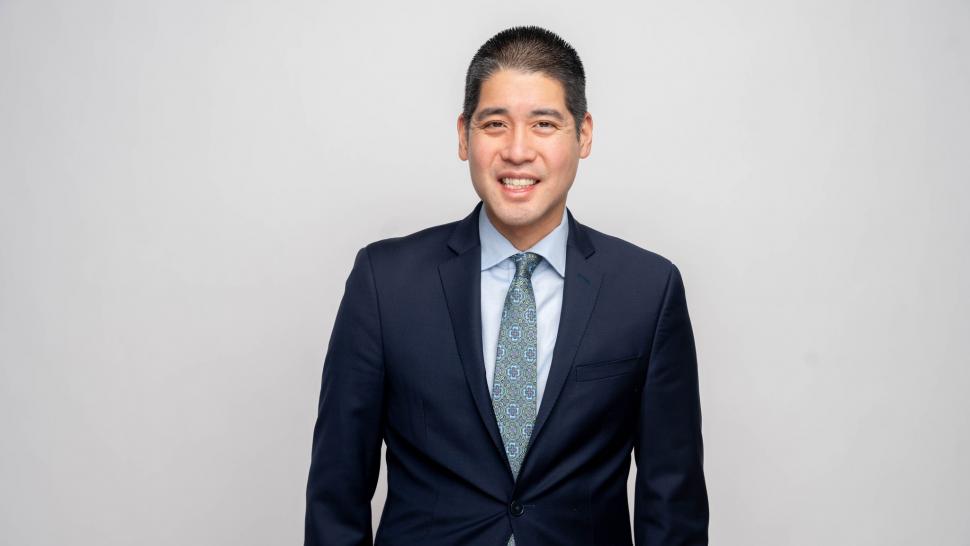
Many may remember Canadian physician Dr. Lawrence Loh for his pivotal role as Medical Officer of Health for the Region of Peel during the COVID-19 pandemic.
Dr. Loh was instrumental in guiding one of Canada’s hardest hit communities through the most challenging health crises in recent history.
Earlier this year, Dr. Loh embarked on a new journey, channeling his experiences into the arts by enrolling in Humber’s Creative Writing Graduate Certificate program and Humber’s weeklong intensive Summer Workshop in Creative Writing.
Completing the certificate program in August, Dr. Loh shares what brought him to Humber, his inspirations and what’s next on his creative agenda.
Your transition to creative writing is a significant shift from public health – what brought you to Humber?
The pandemic was a very trying time for everyone, and everyone’s experience was different. After three years of leading through crises, with barely any time to reflect or spend with my family and friends, I really wanted to take a pause while also engaging my inner creativity.
I’ve always enjoyed writing. I’ve also found inspiration in the work of other physician writers, including Dr. Vincent Lam, who are graduates of the Creative Writing Program at Humber. That prompted me to take some time off and enrol.
What inspires you to write?
My daughters are my inspiration. I’ve always felt, in a broader sense, that stereotypes about East Asians persist in the narratives that are presented in the mainstream North American market. My hope is to write strong Asian voices that can inspire my daughters and the next generation of Asian-Canadians and Asian Americans.
I can concede that there’s a rising prominence of East Asian voices in North American media. I recently read Yellowface by R.F. Kuang and thoroughly enjoyed it. I’m hoping that I can also contribute positively to this space as well.
What are your main takeaways after completing the workshop and creative writing program at Humber?
Humber really opened my eyes to just how beautiful and effective writing fiction is when you’re present and focused on character development. Thinking about how someone might speak, what they might say and do, what they’re focused on, are all ways to put your reader in the moment.
I really can’t read or watch a movie the same way anymore. Nowadays, I’m looking below the surface, trying to unpack the storyteller’s choices.
Participating in Humber’s one-week summer workshop also gave me an exciting glimpse into the voices of the future. I was heartened to see such a diversity of backgrounds and stories among the writers in attendance.
What writing projects are you currently working on?
I’m starting to seek representation for a memoir that draws on my experiences of the pandemic. But this isn’t just another COVID-19 book. I’m trying to turn a dark time into something more positive. Each chapter, penned as letters to my daughters, is a life lesson from a certain moment in the pandemic.
Besides the memoir, I’ve also drafted several fiction manuscripts. My current project, entitled Life Happens at Ten, is based on the idea that so much of what defines our lives happens at 10 p.m. Compare it with, say, 11 a.m. where for most of my adult life I was probably at work.
The story’s premise is that a father leaves behind iPods for his daughters when he passes away, along with a notebook with 10 different dates. At 10 p.m., on those dates, they play that iPod—no matter what they’re doing. The dramatic tension arises from the juxtaposition of the song on what they’re doing at that moment along with the letter explaining what the song meant to their father.
I’m also doing a lot of blogging on LinkedIn and on my website.
During the pandemic, you were described by the media as being very calm, clear and concise in your messaging. What helped keep you focused during that time?
Two different mentors come to mind.
Dr. Eileen de Villa once told me that “anger is unmet expectations.” Someone who’s frustrated probably isn’t directly angry at you. Rather, they’re angry at a setback or crisis. Knowing that helped me to not take things personally.
Peter Dundas, retired Chief of Peel Paramedics and Humber alumnus, also once explained that those leading in crisis need to project calm. It’s about role modelling because if first responders start panicking, everyone else will too.
I’ve adapted Chief Dundas and Dr. de Villa’s advice to my own approach to life. I often tell my daughters that it’s difficult to solve problems if you’re panicking. Similarly, I approached the pandemic with the idea that times are going to be difficult, but if we look out for each other, we’ll get through this together.
Find out more about the Humber program that’s designed for aspiring writers seeking to hone their craft through personalized mentorship and a flexible learning format by visiting the Creative Writing Graduate Certificate program website.